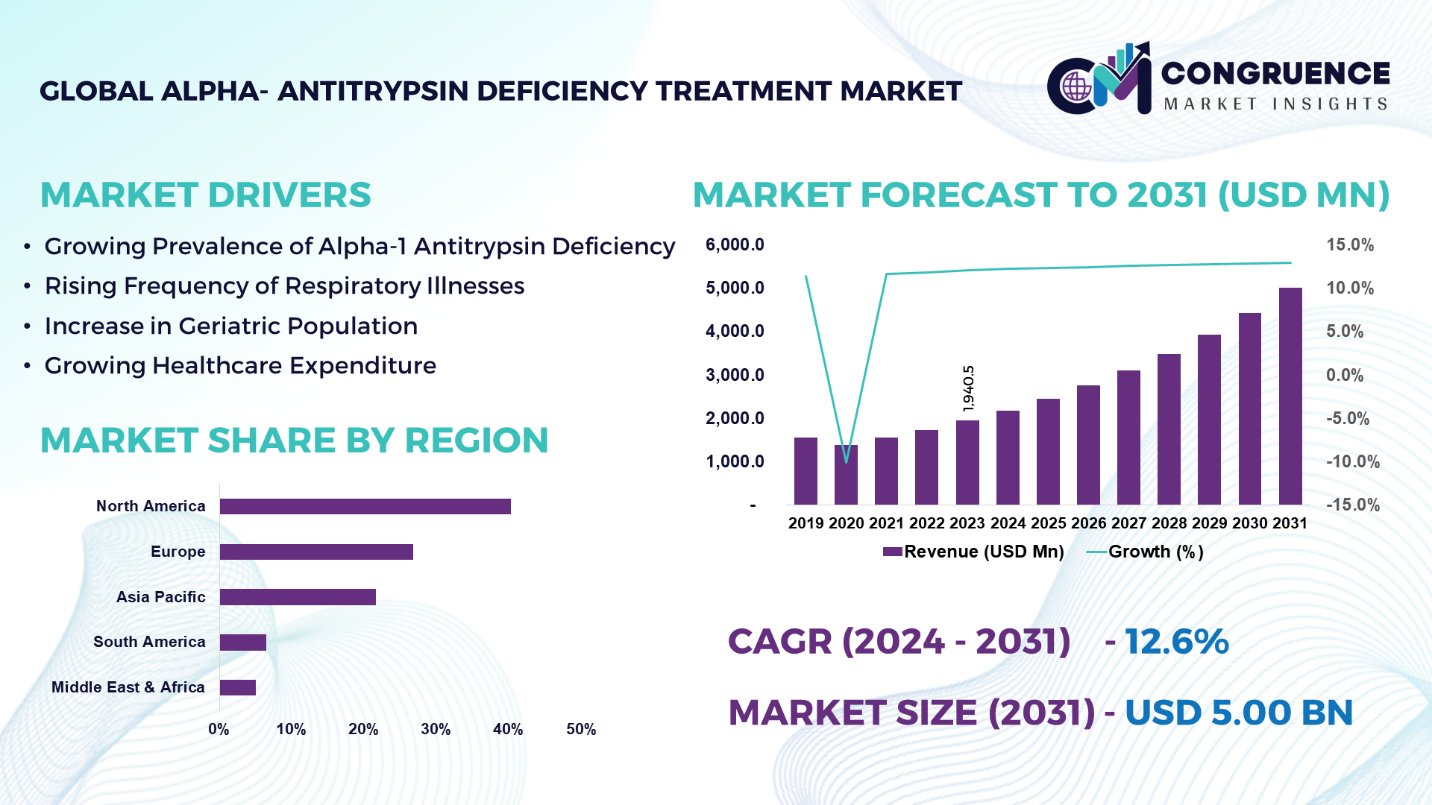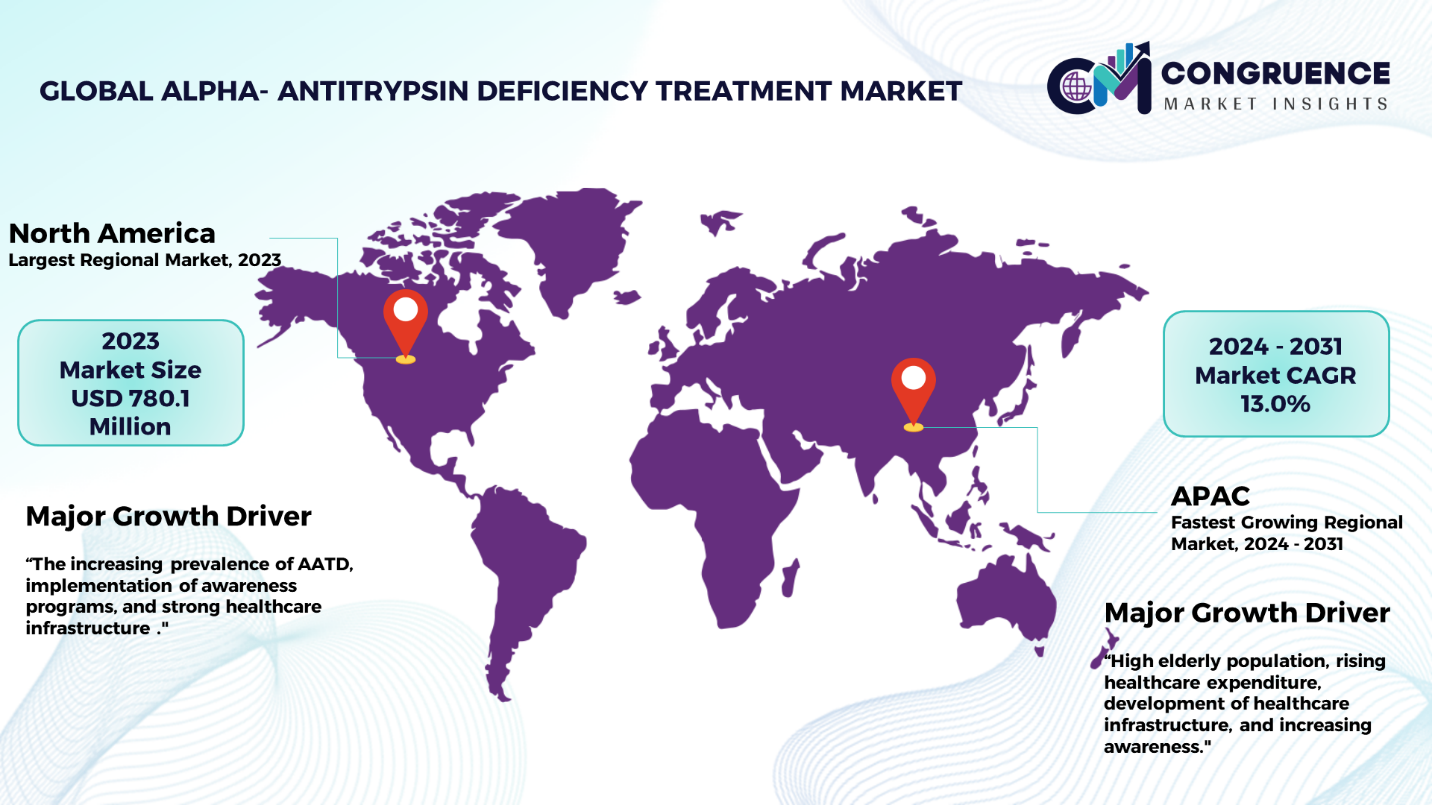Reports
The Global Alpha-Antitrypsin Deficiency Treatment Market was valued at USD 1,940.5 Million in 2023 and is anticipated to reach a value of USD 4,996.6 Million by 2031 expanding at a CAGR of 12.6% between 2024 and 2031.
Alpha- antitrypsin deficiency is a genetic disorder that is it is caused by changes in genes, which is also called mutations. It is an inherited genetic disorder where the body doesn’t produce required amount of alpha-1 antitrypsin (AAT) protein which protects your lungs. These gene changes can cause your body to have low levels of AAT or no AAT in your lungs. Alpha-1 antitrypsin (AAT) is a protein that forms in liver and moves through bloodstream to lungs. There are various kinds of tests for diagnosis of Alpha- antitrypsin deficiency, including genetic testing, pulmonary function tests (PFTs), (PCR) testing, imaging, liver ultrasound or elastography, liver biopsy, blood tests, and others. The several treatment options are there depending on the where Alpha-1 affects, include augmentation therapy, bronchodilators, gene therapy, steroids, oxygen therapy, and pulmonary rehabilitation. The market is growing rapidly due to factors such as growing prevalence of alpha-1 antitrypsin deficiency, rising frequency of respiratory illnesses, increase in geriatric population, and growing healthcare expenditure.

To learn more about this report, request a free sample copy
Alpha-Antitrypsin Deficiency Treatment Market Major Driving Forces
Growing Prevalence of Alpha-1 Antitrypsin Deficiency: The growing awareness and diagnosis of alpha- antitrypsin deficiency due to availability of better diagnostic tools is driving the market growth. Increased awareness among healthcare professionals leads to a higher number of diagnosed cases, contributing to the market growth.
Rising Frequency of Respiratory Illnesses: The increasing incidences of respiratory disorders such as asthma, bronchitis, and chronic obstructive pulmonary disease (COPD) is driving the market growth. The rising frequency of respiratory illness drives the demand for AATD treatments.
Increase in Geriatric Population: The increase in the elderly or geriatric population is creating a demand for AATD treatments. Geriatric population is more prone to various kinds of respiratory diseases, which is boosting demand for AATD treatments.
Growing Healthcare Expenditure: The rising healthcare expenditure across the globe, coupled with improved access to healthcare services are driving the growth of the Alpha-Antitrypsin Deficiency Treatment market. Increased healthcare spending enables better diagnosis, treatment, and management of rare illnesses.
Alpha-Antitrypsin Deficiency Treatment Market Key Opportunities
Healthcare Infrastructure Development: The increasing investments in improving healthcare infrastructure is expected to create significant opportunities for market growth. Ongoing investments in advanced medical technologies for healthcare professionals can lead to more accurate diagnosis and treatment alpha- antitrypsin deficiency.
Targeted Therapies: The growing emphasis on targeted therapies medicine based on individual patient genetic profiles is anticipated to provide opportunities for the development of more targeted and effective medicines. The development of targeted therapies aimed at addressing the AATD patients can enhance treatment outcomes.
Technological Advancements: Technological advancements in drug delivery systems is expected to provide numerous opportunities for market expansion. Furthermore, innovation of new diagnostic techniques, and new drug development are improving the precision of AATD diagnosis and the effectiveness of treatment.
Alpha-Antitrypsin Deficiency Treatment Market Key Trends
· The increased utilization of augmentation treatment is a significant factor propelling the market growth
· Growing preference for lightweight and all-season Alpha-Antitrypsin Deficiency Treatments to accommodate changing climate patterns
· The increasing prevalence of alpha- antitrypsin deficiency is a major factor boosting demand for Alpha-Antitrypsin Deficiency Treatments
· The growing awareness among healthcare professionals and patients is creating a demand for Alpha-Antitrypsin Deficiency Treatments
· The development of personalized medicine which target individual genetic profiles and specific patient needs are gaining traction
· Technological advancements in drug delivery systems, innovation of new diagnostic techniques, and new drug development are improving the precision of AATD diagnosis
· The use of remote monitoring and telemedicine can improve remote access and facilitate better disease management and treatment
Region-wise Market Insights
North America accounted for the largest market share at 40.2% in 2023 whereas, Asia Pacific is expected to register the fastest growth, expanding at a CAGR of 13.0% between 2024 and 2031.

To learn more about this report, request a free sample copy
In North America, the demand is driven by the increasing prevalence of AATD, implementation of awareness programs, and strong healthcare infrastructure in the region. In addition, rising investments by the major players, high healthcare spending, and favorable reimbursement policies, and strong government support drives the regional market growth. Europe is the largest market for the Alpha-Antitrypsin Deficiency Treatment due to expanding patient pool, regulatory environments, and increased awareness among the patients regarding Alpha 1-Antitrypsin deficiency treatment. In Asia-Pacific, the market is characterized by the high elderly population, rising healthcare expenditure, development of healthcare infrastructure, and increasing awareness which has created an increasing demand for Alpha-Antitrypsin Deficiency Treatments. The Middle East and Africa has been witnessing a growing demand for Alpha-Antitrypsin Deficiency Treatments due to increasing investment in healthcare infrastructure whereas, in South America, the market is influenced by economic factors, with growing awareness and ongoing improvements in healthcare infrastructure.
Market Competition Landscape
The global Alpha-Antitrypsin Deficiency Treatment market is characterized by high degree of competition among a large number of manufacturers. Major players have adopted product launch, product approval, and acquisition as key developmental strategies to improve their product portfolio in the market. Established brands leverage their reputation for quality and reliability to maintain market share, while newer entrants focus on disruptive innovations and unique selling propositions.
Key players are increasingly investing in research and development activities for the development of new and more effective therapies for the patients with alpha- antitrypsin deficiency. Moreover, major companies are actively collaborating with pharmaceutical companies, research institutions, and patient advocacy groups to develop effective treatments.
Key players in the global Alpha-Antitrypsin Deficiency Treatment market implement various organic and inorganic strategies to strengthen and improve their market positioning. Prominent players in the market include:
· Pfizer Inc.
· Baxter
· AstraZeneca
· Grifols, S.A.
· Adverum Biotechnologies, Inc.
· Teva Pharmaceutical Industries Ltd.
· Carolus Therapeutics, Inc.
· Boehringer Ingelheim International GmbH
· Kamada Ltd.
· GSK plc.
· CSL
· Lfb Biomedicaments SA
· Digna Biotech S.L.
· Arrowhead Pharmaceuticals, Inc.
|
Report Attribute/Metric |
Details |
|
Market Revenue in 2023 |
USD 1,940.5 Million |
|
Market Revenue in 2031 |
USD 4,996.6 Million |
|
CAGR (2024 – 2031) |
12.6% |
|
Base Year |
2023 |
|
Forecast Period |
2024 – 2031 |
|
Historical Data |
2019 to 2023 |
|
Forecast Unit |
Value (US$ Mn) |
|
Key Report Deliverable |
Revenue Forecast, Growth Trends, Market Dynamics, Segmental Overview, Regional and Country-wise Analysis, Competition Landscape |
|
Segments Covered |
· By Treatment Type (Augmentation Therapy, Bronchodilators, Gene Therapy, Steroids, and Others) · By Route of Administration (Oral, Inhalation, and Intravenous) · By Diagnostic Tests (Genetic Testing, Pulmonary Function Tests (PFTs), (PCR) Testing, and Others) · By End-User (Hospitals, Specialty Clinics, Homecare Settings, and Research Institutions) |
|
Geographies Covered |
North America: U.S., Canada and Mexico Europe: Germany, France, U.K., Italy, Spain, and Rest of Europe Asia Pacific: China, India, Japan, South Korea, Southeast Asia, and Rest of Asia Pacific South America: Brazil, Argentina, and Rest of Latin America Middle East & Africa: GCC Countries, South Africa, and Rest of Middle East & Africa |
|
Key Players Analyzed |
Pfizer Inc., Baxter, AstraZeneca, Grifols, S.A., Adverum Biotechnologies, Inc., Teva Pharmaceutical Industries Ltd., Carolus Therapeutics, Inc., Boehringer Ingelheim International GmbH, Kamada Ltd., GSK plc., CSL, Lfb Biomedicaments SA, Digna Biotech S.L., Arrowhead Pharmaceuticals, Inc. |
|
Customization & Pricing |
Available on Request (10% Customization is Free) |
